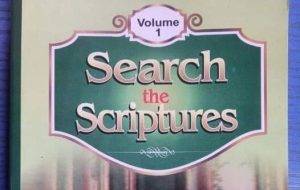 Deeper Life Search The Scripture July 30, 2023
Deeper Life Search The Scripture July 30, 2023
Read DCLM Search The Scripture July 30, 2023
ADULT STS LESSON 72
CLARIFICATION OF MORAL LAWS
MEMORY VERSE: “Ye shall therefore keep my statutes, and my judgments: which if a man do, he shall live in them: I am the LORD” (Leviticus 18:5).
TEXT: Leviticus 17-19
DCLM Search The Scripture July 30, 2023 Outline:
After spending more than four hundred years in Egypt, the children of Israel imbibed some of the immoral lifestyles and idolatrous practices from the Egyptians. This sinful acculturation continued to affect their relationship with God as they could not consistently obey Him. In the text, God drew their attention to the necessity of holiness in their walk with Him. He furnished them with a comprehensive catalogue of prohibitions, moral precepts and practical obligations aimed at making them a peculiar people, distinct from surrounding heathen nations.
Apart from the corrupting influences of a long sojourn in Egypt, in the present text, God responded by enacting laws that will regulate the lifestyle and systems of worship by His people. While He reiterated some precepts and commandments that had been given earlier, He also introduced new ones in the face of Israel’s present realities. Repetition and emphasis are common in the scripture as necessary antidotes to man’s tendency to forget and slide from the right path (Philippians 3:1). Peter the apostle considers failure to reiterate essential saving truths of the Scripture to the flock as spiritual negligence, which leaders must avoid (2 Peter 1:12).
1. LAWS REGARDING SPECIAL SACRIFICES
Leviticus 17:1-16; Numbers l5:30; 1 Corinthians 10:20; Leviticus 3:17; 7:26,27; Deuteronomy 12:16,23-25; Matthew 26:28; Romans 3:25: Ephesians 1:7
When the children of Israel settled in the Promised Land, they became widely dispersed from their leadership and from one another. Some of them settled at a considerable distance from the tabernacle. The new situation brought with it the temptation to succumb to self-will and the corrupting influences of the inhabitants of Canaan who made sacrifices everywhere. It was to counter this danger and reinforce godly standards among the people that God sent the renewed moral laws through Moses. “To the end that the children of Israel may bring their sacrifices, which they offer in the open field, even that they may bring them unto the LORD, unto the door of the tabernacle of the congregation, unto the priest, and offer them for peace offerings unto the LORD” (Leviticus 17:5).
The duty of making sacrifices was given to the priests. Before this enactment, it had been a long-standing practice for householders to erect altars where they also played the role of the priest by offering sacrifices for themselves and for their families unto God. Noah, Abraham, Job, all erected altars and offered sacrifices unto God by themselves (Genesis 8:20; 15:10,11; Job 1:5). This liberty became a source of corruption in worship as individuals invented practices according to their various imaginations.
Some Israelites learnt to sacrifice to devils like their Egyptian hosts. The law of sacrifice prohibits sacrificing to God in the open fields. It permitted both the Israelites and strangers in their midst to kill animals for sacrifice only on God’s altar in the tabernacle. The designation of the tabernacle at Shiloh and inauguration of the priesthood were complimentary to this law. It gave due solemnity to public worship in Israel. Disobedience to this law was punishable by death (Leviticus 17:4,9). Though the law was designed as a standard uniform practice of worship in lsrael “for ever… throughout their generations”, it was often breached by the people.
The New Testament underpinned by the perfect sacrifice of our Lord and Savior brought an end to the Old Testament ceremonial laws, including that of animal sacrifices. The scripture captures this beautifully: “Wherefore when he cometh into the world, he saith, Sacrifice and offering thou wouldest not, but a body hast thou prepared me: In burnt offerings and sacrifices for sin thou hast had no pleasure… Then said he, Lo, I come to do thy will, O God. He taketh away the first, that he may establish the second…every priest standeth daily ministering and offering oftentimes the same
sacrifices, which can never take away sins: But this man, after he had offered one sacrifice for sins for ever, sat down on the right hand of God” (Hebrews 10:5-12). Christ’s death is the final and acceptable sacrifice for forgiveness and cleansing from sin.
The New Testament thus ushers in a new dispensation of the gospel of Christ and acceptable worship. Since Christ died for all people in the universe, God has also designed that worship should not be confined to a single place. Christ reveals this to the Samaritan woman. “Woman, believe me, the hour cometh, when ye shall neither in this mountain, nor yet at Jerusalem, worship the Father. But the hour cometh, and now is, when the true worshippers shall worship the Father in spirit and in truth: for the Father seeketh such to worship him” (John 4:21,23).
Today, holy hands may be lifted to God by the church everywhere (1 Timothy 2:8) and a sweet smelling fragrance of true and acceptable worship ascends to God in every place. Christ is our true tabernacle as well as our altar of sacrifice. Nevertheless, we are not to neglect the gathering of ourselves together in places of our public worship (Hebrews 10:24). The law against the eating of blood was repeated here for emphasis and as a reminder, having been given earlier (Leviticus 3:17: 7:26: Genesis 9:14). “And whatsoever man there be of the house of Israel, or of the strangers that sojourn among you, that eateth any manner of blood; I will even set my face against that soul that eateth blood, and will cut him off from among his people” (Leviticus 17:10).
God considered the infringement of this law so serious that it carried capital punishment. This is because “the life of the flesh is in the blood”. God instructed that the blood of animals be poured out because “..it is the blood that maketh an atonement for the soul” (verse 11). The prohibition was because: One, blood is the life of the animal and it belongs to God. Two, it is solely set aside for atonement.
Three, idol worshippers were given to drinking or eating the blood of their sacrifices and God does not want His worship to have a semblance of idolatry. Four, He wants His people to have regard for life. Five, the blood of those sacrificial animals in the Old Testament foreshadowed the blood of Jesus Christ which should be shed to atone for the sins of mankind. It must therefore be held sacred.
Under the New Testament dispensation, sacrifice to God no longer entails slaughtering animals and sprinkling their blood. This is because, One, Jesus has accomplished on the cross at Calvary what those rituals in the Old Testament stood for. Our sacrifices are now of a spiritual nature (Hebrews 13:16; 1 Peter 2:5).
We are to come with the spiritual sacrifices of faith, holiness, praise and service to God. We can also give our tithes and offerings as part of our sacrifice and worship to God. Two, children of God are no longer restricted to a specific location in offering spiritual sacrifices. Instead, We can now worship God everywhere (John 4:21-24; 1 Timothy 2:8). Three, Jesus is our Priest and sacrificial Lamb. We are therefore, commanded to offer sacrifices to God through Him (Hebrews 13:15).
Four, the blood of Jesus has atoned for our sins. His blood is far better than the blood of bulls and goats in value and efficacy: od still forbids eating of blood in the New Testament (Acts 15:20,29). Believers must be steadfast in the faith lest they be guilty of treading under or counting Christ’s blood an unholy thing (Hebrew 10:28,29).
Continue reading DCLM Search The Scripture July 30, 2023
2. LAWS AGAINST IMMORAL RELATIONSHIPS
Leviticus 18:1-30; 11:44; Romans 8:13; 2 Corinthians 6:17; Proverbs 4:14: Romans 12:2; 1 Peter 4:1-4; Hebrews 13:4; Deuteronomy 28:15; Joshua 1:8; Psalm 1:1-3; 1 John 2:17
In furtherance of His directives, God ordered the children of Israel not to emulate the immoral practice and lifestyle of the heathen nations among whom they dwelt. “Thus saith the LORD, Learn not the way of the heathen…” (Jeremiah 10:2). The believer is commanded to “come out from among them [the heathen] and be ye separate”, from their practices, customs and traditions (2 Corinthians 6:17; Romans 8:13).
Two major areas where the Egyptians and Canaanites had negatively impacted on the children of Israel were the marriage relationship and profane worship. Usually idolatrous practices are steeped in immoral relationships and moral perversions. All kinds of sexual perversions typified their religious and social lives. They unashamedly practiced incest, homosexuality (sodomy or lesbianism), bestiality and sacrificing their children to Molech.
Our text includes a record of immoral relationships that God prohibited among His people. These include, One, incest which is any form of sexual relationship or marriage between close relations. Such will include marrying a parent, sibling, half brother or half sister, stepmother or father, grand children, aunt, uncle and in-law. Two, adultery
which comprises any sexual relationship or marriage to another person’s spouse. Three, sexual relationship with a menstruating woman. This practice is said to be associated with some idolatrous rituals.
Four, homosexuality which could either be sodomy (a man having sexual relations with another man) or lesbianism (a woman having sexual relationship with another woman). Five, bestiality-the practice of a human being having sexual relationship with an animal. This is utter confusion!
All these relationships and sexual perversion can undermine the institution of marriage and pose challenge to God’s original plan for marriage. God’s purpose is that husband and wife should be one flesh But those who embrace homosexuality will have a hard time explaining how two sodomites or lesbians can become one flesh. The bestial person is even more absurd – a man or woman being one flesh with an animal. What an abomination! God also prohibited the children of Israel from the familiar idolatrous practice of making their children to pass through the fire.
The Scripture mentions the idol ‘Molech’ in connection with this practice. God recommended the death penalty for those who were involved in such evil practices. God warned His people against breaking these laws by drawing their attention to the tragedy which befell the Canaanites. If they follow the wicked examples of the Canaanites whom God disinherited of their land and gave it to Israel, the same doom would befall them. He did not only caution against disobedience, He also promised eternal life to those who keep His commandments. He said, “Ye shall therefore keep my statutes, and judgments: which if a man do, he shall live in them: I am the LORD” (Leviticus 18:5).
Obedience to God’s words is a prerequisite for blessing under both the Old and New Testaments.
3. LAWS REGULATING PERSONAL CONDUCT
Leviticus 19:1-37; 11:44,45; 20:7,26; 21:8; Matthew 5:48; 2 Corinthians 6:14-16; Leviticus 22:19,29; 26:1; Exodus 20:3-5,8-17; 22:21; 23:32; Isaiah 8:19; 1 Timothy 4:1- 4; 1 John 5:21; Leviticus 23:32; Exodus 23:11; Luke 12:33; Acts 4:34-37; James 5:4
God commanded Moses to “Speak unto all the congregation of the children of Israel, and say unto them, Ye shall be holy: for I the LORD your God am holy (Leviticus 19:21. None in this congregation is exempted from this divine directive.
The reason for this command was because He is holy. Having created us in image and likeness, He is greatly pleased and delighted to have us resemble Him in character, disposition and relationship. The timeless relevance of this divine demand for holiness underpins its reiteration in the New Testament for all believers. “But as he which hath called you is holy, so be ye holy in all manner of conversation; Because it is written, Be ye holy; for I am holy (1 Peter 1:15,16).
Holiness or sanctification experience can be obtained by saved, consecrated, thirsty and faith-filled believers who pray to God for it. The holiness God demanded from them was not abstract; that was why He gave the details of what He expected them to do that will reflect His holiness. God listed some commandments that His people must keep and these relate to their moral, social and religious lives.
Some of the commands were intended to human depravity and corruption while some others were to show the tenderness and care of God for His people, especially to those who are less privileged or handicapped. These include: One, command for filial reverence and sabbath observance; Two, prohibition of idolatry, spiritism and occultism; Three, law against coercion and self-will in religion; four, law against theft, fraud and lying; Five, prohibition of rash vows, swearing and irreverence for God’s name. Six, command to avoid talebearing and hatred; Seven, religious laws of segregation and first fruits of trees; and Eight, injustice in judgement and business.
Another area where God commanded that His people should be different has to do with the practice of mourning for the dead. Practices such as rounding the corner of the head, cutting corners of the beard, cuttings on the flesh for the dead and printing marks on the body were common practices of idolatrous nations. In our present day, we must shun related practices which people do for the sake of fashion. The craze for strange haircuts, tattoos on the body and the likes should be avoided totally and completely.
Ceremonial rites that have idolatrous connections must be opposed and discarded particularly during marriage, naming and burial ceremonies. God also forbade the practice of making daughters to become prostitutes. Parents must take heed not to initiate their daughters into prostitution either by directly sponsoring them or through sheer inattention or carelessness. (God also prohibits any actions that can hurt our neighbors such as talebearing, hatred, gossip and character assassination that can weaken the bond of love and unity and destroy the fellowship of believers. For the welfare of the under-privileged, God put in place, the law of gleaning.
An Israelite must not go over the field after harvest to gather the leftovers. Instead. The poor, the orphans, the strangers and the destitute were allowed to collect those leftovers for their living. This law pointed out the duty of the rich towards the poor: that they should make conscious efforts and plans to assist those who are less privileged. The New Testament also enjoins believers to engage in good works and not to be unduly stingy or tight-fisted.
The poor and the needy are however, not expected to be idle. God forbids depriving a laborer of his lawful wages and taking advantage of the handicapped such as the blind, deaf and dumb. We must not curse or abuse the deaf, neither should we put a stumbling block before the blind nor lead them astray. Within the context of the New Testament, this implies we must not withhold the knowledge of the way of salvation from sinners by not preaching Christ to them. It also involves abstaining from anything that may make a believer to fall (Romans 14:13; 1Corinthians 8:9).
The aged must be properly cared and strangers should not be oppressed, denied their rights or defrauded. As God’s children, we should show forth His love and care for the well-being of others particularly those who are less-privileged and of the household of faith, while shunning corrupt and depraved inclinations. No one is exempted from observing and obeying the moral laws of God.
The natural man is graceless and Cannot keep these commandments but thankfully, everyone can be empowered through salvation to keep them (Titus 2:11). When an individual is saved, such Stands in a better position to continually receive grace from God to obey these laws and abide in Christ.
Questions For Review:
1. How should spiritual leaders respond to the increase moral and spiritual corruption these last days?
2. What is the importance of repetition and emphasis of certain laws in the Scriptures?
3. Highlight the law against indiscriminate sacrifice and the lessons from it.
4. Explain God’s instruction concerning blood and how it applies to present-day believers.
5. Highlight the significance of the New Testament dispensation to the believer’s calling.
6. Mention some improper relationships that God prohibits among His people and why.
7. Explain how God expects His people to be distinct in their lifestyle of holiness.
Thank you for reading DCLM Search The Scripture July 30, 2023
READ MORE TOPICS: OPEN HEAVENS, OUR DAILY BREAD, IN TOUCH, SEEDS OF DESTINY, STREAMS OF JOY, JOEL OSTEEN, MOUNTAIN TOP LIFE, DCLM DAILY MANNA, UCB WORD FOR TODAY



